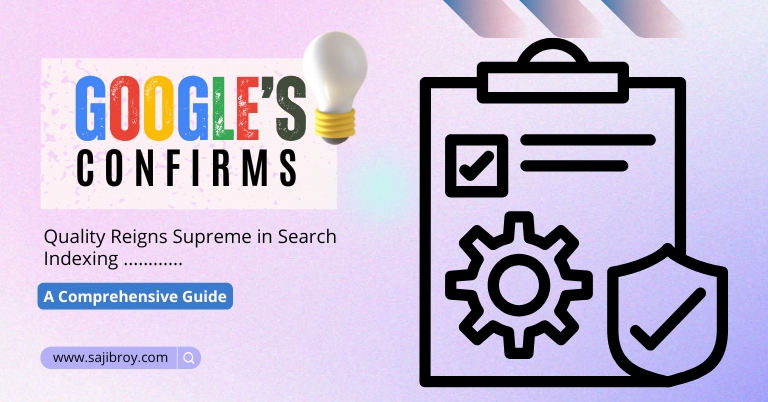Welcome to Module 2 of the “Strategy of SEO” course. In this class, we will dive into the essential elements of personal and company branding, and how they impact your SEO efforts. Building a strong brand presence online is critical to establish credibility and trust with your audience, and ultimately drive more traffic and conversions to your website.
Additionally, we will explore the world of domain and hosting, and provide an overview of these technical aspects of website creation. By the end of this class, you’ll have a solid foundation in branding and website infrastructure, and be equipped with the knowledge to take your SEO strategy to the next level. Let’s get started!
Let's See the Topic Overview
1. What is Personal/Company Branding?
Personal or company branding in online refers to the process of establishing a strong online presence for an individual or organization, which helps to create a positive image in the minds of potential customers or clients. This can include various elements such as website design, social media profiles, content marketing, and online reputation management.
For example, a popular personal branding strategy used by many individuals is to create a professional website that showcases their expertise and achievements. They may also utilize social media platforms like LinkedIn, Twitter, or Instagram to network with others in their industry, share relevant content, and engage with their followers.
On the other hand, company branding in online can include creating a strong and consistent visual identity across all digital channels such as website, social media, email marketing, and other forms of digital communication. This can include the use of logos, colors, and fonts to help create a recognizable and memorable brand image. By establishing a strong online presence and brand identity, companies can build trust with their target audience, increase customer loyalty, and ultimately drive more sales and revenue.
2. Why need Online Personal/Company Branding?
Online personal/company branding is essential in today's digital world as it can significantly impact the success of individuals or businesses. Here are some reasons why building an online brand is crucial:
- Establishes credibility: Having a strong online presence through personal or company branding can establish credibility and authority within a particular industry or niche. It helps to showcase expertise and knowledge, making it easier for potential clients, customers or employers to trust and do business with the individual or company.
- Increases visibility: Online branding allows individuals or businesses to increase their visibility and reach a wider audience. By utilizing social media, blogs, and other online platforms, they can promote their brand and interact with potential customers or clients, which can help drive traffic to their website and increase sales.
- Builds relationships: A strong online brand can help build long-term relationships with customers, clients, or followers. Through regular communication and engagement on social media or other platforms, individuals or businesses can connect with their audience and establish a loyal following.
- Increased engagement: Building an online brand can also help you connect with your audience on a deeper level. By creating a strong, consistent brand message and engaging with your audience through social media, email marketing, and other channels, you can build a loyal following and foster long-term relationships with your customers or clients.
- Improves search engine ranking: Consistent and strategic online branding can help improve search engine ranking for individuals or businesses. By creating high-quality content, utilizing keywords and phrases, and optimizing their website and social media profiles, they can improve their visibility on search engines such as Google, making it easier for potential clients or customers to find them.
- Competitive advantage: In a crowded marketplace, having a strong online brand can provide a competitive advantage. By differentiating themselves from others and showcasing their unique value proposition, individuals or businesses can stand out and attract more customers or clients.
- Career Advancement: Personal branding can also help in career advancement by showcasing your skills, expertise, and accomplishments to potential employers or clients. It can help you stand out in a crowded job market and increase your chances of being hired or chosen for projects.
- Protects your reputation: In today's age of social media, a single negative comment or review can damage your reputation. By building a strong online presence, you can proactively manage your reputation by responding to negative feedback and promoting positive reviews and testimonials.
- Better customer service: Finally, building an online brand can also improve your customer service. By providing valuable content, engaging with your audience, and responding to customer feedback and inquiries in a timely and professional manner, you can create a positive reputation for your brand and build customer loyalty.
For example, an entrepreneur who runs a small online clothing store can use online branding to showcase their unique products, share their story and build a community of loyal customers through social media and a well-designed website. By doing so, they can increase their visibility, build credibility, and gain a competitive advantage in the market.
3. How to Make Your Own Personal/Company Online Branding
Creating your own personal or company branding online can seem like a daunting task, but it can be broken down into several steps:
- Define your brand identity: Before you start building your brand, you need to define what it is that you stand for. Consider what sets you apart from others in your field and what values you want to communicate. This will help you create a brand that is authentic and consistent.
- Develop your brand message: Once you have defined your brand identity, you need to develop a message that communicates it to your target audience. This should be a clear and concise statement that captures the essence of your brand.
- Design your brand visual elements: Your brand's visual identity includes things like your logo, color palette, typography, and imagery. These elements should be consistent across all of your online platforms, such as your website, social media accounts, and email marketing.
- Build your online presence: Start by creating a website that reflects your brand identity and message. You can use website builders like Wix or WordPress to create a professional-looking site without any coding experience. Make sure your website is optimized for search engines, mobile-friendly, and easy to navigate.
- Create social media profiles: Choose the social media platforms that are most relevant to your target audience and create profiles that reflect your brand identity. Be consistent with your branding across all platforms and use social media to engage with your audience and build relationships.
- Create valuable content: To build your online presence, you need to create content that is valuable to your target audience. This could include blog posts, videos, infographics, and social media posts. Make sure your content is high-quality, relevant, and consistent with your brand message.
- Monitor and adjust: Building an online brand is an ongoing process. You need to monitor your online presence and adjust your strategy as needed to stay relevant and engage with your target audience.
Remember, building a strong online brand takes time and effort, but it can pay off in the long run by helping you stand out in your field and build a loyal following.
4. Domain Overviews
What is Domain?
A domain name is the address that people use to access your website on the internet. It is a unique name that identifies a website on the internet. It typically consists of two parts: the top-level domain (TLD) and the second-level domain (SLD). For example, in the domain name "google.com," "google" is the SLD and ".com" is the TLD. The SLD is the actual name of the website, while the TLD refers to the type of organization or geographical location associated with the website.
Types of the Domain
There are several types of domain names available to choose from, depending on the nature and purpose of your website. Here are some of the most common types of domain names:
- Top-level domains (TLDs): These are the most common type of domain name and include the familiar .com, .org, and .net extensions. TLDs are managed by the Internet Assigned Numbers Authority (IANA) and are divided into two categories: generic top-level domains (gTLDs) and country code top-level domains (ccTLDs).
- Country code top-level domains (ccTLDs): These domain names are specific to a particular country or region. For example, .uk is the ccTLD for the United Kingdom, while .ca is the ccTLD for Canada. Some ccTLDs have specific registration requirements and may only be available to residents or businesses within the corresponding country or region.
- Subdomains: These are additional levels that can be added to a domain name, allowing for more specific website addresses. For example, in the domain name "blog.google.com," "blog" is a subdomain of "google.com."
- Internationalized domain names (IDNs): These are domain names that use non-ASCII characters, allowing for website addresses to be written in non-Latin scripts such as Arabic, Chinese, or Cyrillic.
When selecting a domain name, it's important to consider which type of domain will best serve your needs. For example, if you are a business targeting a specific country or region, a ccTLD may be the most appropriate option. If you want a more universal and recognizable domain name, a gTLD such as .com may be a better choice.
Best Domain Name Selection
Choosing the right domain name is important as it can have a significant impact on your website's search engine ranking and overall online success. Here are some tips to help you select the best domain name:
- Keep it simple: Choose a domain name that is easy to spell, remember, and pronounce. Avoid using slang, abbreviations, or hyphens.
- Make it brandable: Choose a domain name that is unique and memorable. It should reflect your brand and be easily recognizable.
- Use keywords: Consider using relevant keywords in your domain name. This can help improve your search engine ranking and attract more traffic to your site.
- Check availability: Make sure the domain name you want is available. You can use a domain name registrar like GoDaddy or Namecheap to check availability and purchase your domain.
- Choose the right extension: Consider using a top-level domain (TLD) like .com, .org, or .net. These extensions are more popular and widely recognized.
- Keep it short: A shorter domain name is easier to remember and type. Aim for a domain name that is no more than 15 characters long.
- Avoid copyright issues: Make sure your domain name does not infringe on any existing trademarks or copyrights. This can lead to legal issues and damage your brand reputation.
By following these tips, you can choose a domain name that is memorable, brandable, and optimized for search engines, which will help you establish a strong online presence.
Best Platform to buy a domain
There are several platforms available where you can buy a domain name, but it's important to choose a reliable and trustworthy one. Some of the best options for buying a domain name include:
- Domain registrars: These are companies that specialize in selling and managing domain names. Some popular domain registrars include GoDaddy, Namecheap, and Domain.com.
- Web hosting providers: Many web hosting companies also offer domain registration services. This can be a good option if you're planning to set up a website and need both hosting and a domain name. Some popular web hosting providers that offer domain registration include Bluehost, SiteGround, and HostGator.
- Online marketplaces: You can also buy domain names from online marketplaces such as Sedo, Flippa, and Afternic. These platforms allow you to search for and purchase domain names from other sellers.
When choosing a platform to buy your domain name, consider factors such as pricing, customer support, and ease of use. It's also important to ensure that the platform you choose is reputable and has a good track record of providing quality domain registration services.
5. Overview of the Hosting
Hosting is a service that enables individuals and organizations to store and manage their website files and data on a remote server, making their website accessible on the internet. There are different types of hosting available in the market, each with its own benefits and drawbacks.
- Shared Hosting: This is the most common type of hosting where multiple websites are hosted on a single server. Shared hosting is affordable and easy to set up, making it a popular choice for beginners and small businesses.
- VPS Hosting: Virtual Private Server (VPS) hosting is a step up from shared hosting. It provides a dedicated portion of a server with more resources and flexibility than shared hosting. This type of hosting is suitable for businesses that require more control over their server settings and performance.
- Dedicated Hosting: With dedicated hosting, you have full access to an entire server that is exclusively yours. This means you have complete control over the server's resources and performance. Dedicated hosting is ideal for large businesses with high traffic websites and custom software needs.
- Cloud Hosting: This type of hosting utilizes multiple servers to distribute resources, making it more reliable and scalable than other hosting types. Cloud hosting is suitable for businesses that require high levels of uptime, such as e-commerce stores and large-scale websites.
When it comes to selecting the best option for your hosting needs, it depends on your website's requirements, budget, and level of technical expertise. There are many popular hosting platforms available such as Hostinger, Bluehost, HostGator, SiteGround, and more. These platforms offer a range of hosting types and plans to choose from, with varying levels of support and pricing. It's essential to choose a reliable hosting provider with a good reputation, excellent customer support, and reliable uptime.
In conclusion, choosing the right hosting provider and type of hosting is critical to ensure your website is accessible, fast, and secure. It's important to do your research and select a provider that meets your specific requirements and budget.
Importance of the hosting in SEO Marketing
Hosting plays a critical role in SEO marketing, as it can directly impact the performance and ranking of a website. Here are some reasons why hosting is important in SEO marketing:
- Website speed: The speed at which your website loads is a crucial factor in determining your search engine ranking. A slow-loading website can lead to high bounce rates, lower user engagement, and a drop in rankings. Hosting providers with fast servers and high bandwidth can help ensure that your website loads quickly, providing a positive user experience and improving your SEO performance.
- Server uptime: Server uptime refers to the amount of time that your website is accessible to visitors. Downtime can occur due to server maintenance, server crashes, or other technical issues. Frequent downtime can negatively impact your search engine ranking, as search engines prioritize websites with high uptime. Choosing a reliable hosting provider with a strong track record of server uptime is essential for maintaining your website's accessibility and SEO performance.
- Security: Website security is a critical factor in SEO performance, as search engines prioritize secure websites that protect user data. Hosting providers that offer robust security features, such as SSL certificates, firewalls, and malware scanning, can help ensure that your website is secure and protected from potential threats.
- Location: The location of your hosting server can also impact your search engine ranking. Search engines prioritize websites that are hosted in the same location as their target audience, as this provides a better user experience. Choosing a hosting provider with servers located in your target market can help improve your website's SEO performance.
To ensure that your hosting provider is helping, not hindering, your SEO efforts, it is important to select a reputable hosting provider that offers reliable and fast hosting services, strong security features, and servers located in your target market.
Why Online Branding, Domain and Hosting Overviews Class is Important for an SEO Beginner?
Online Branding, Domain, and Hosting Overviews are crucial aspects of SEO, and understanding their importance and how to utilize them can greatly benefit an SEO beginner. Here are the reasons why this class is important:
- Building a strong online presence through branding is essential for businesses and individuals to stand out from their competition.
- Selecting the right domain name is crucial for SEO as it affects website rankings and online visibility.
- Choosing the best hosting platform can improve website speed, security, and overall performance, which are all important ranking factors.
To make the most of these aspects, an SEO beginner needs to learn the steps for each one:
- Online Branding: Start by creating a brand identity that accurately represents your business or personal brand. This includes choosing a brand name, logo, and creating a consistent brand image across all online platforms.
- Domain Name Selection: Choose a domain name that is relevant to your brand, easy to remember, and easy to type. Use keywords in your domain name if possible and avoid using numbers, hyphens, and special characters.
- Best Option and Platform to Buy a Domain: There are several domain registrar options to choose from, such as GoDaddy, Namecheap, and Domain.com. Consider the pricing, customer support, and features offered by each platform.
- Hosting Overviews: Select the right hosting option based on the size and complexity of your website, the level of security and speed required, and the amount of traffic you expect. Consider options such as shared hosting, dedicated hosting, or cloud hosting.
In conclusion, the Online Branding, Domain, and Hosting Overviews Class is essential for an SEO beginner to understand the importance of these aspects and learn the necessary steps to implement them effectively.












